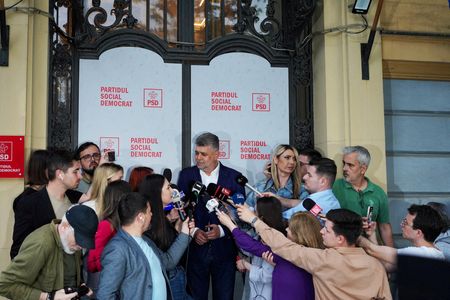By Luiza Ilie, Libby George and Gergely Szakacs
BUCHAREST/LONDON (Reuters) -Romania’s central bank said on Tuesday it was looking for the “optimal way” to counter significant capital outflows amid steep falls in the leu currency after a hard-right opposition leader won the first round of a repeat presidential election.
The bank, which holds its next policy meeting on May 16, held its benchmark interest rate at the European Union’s joint-highest 6.5% level last month, faced with heightened risks over trade tariffs and fiscal uncertainty ahead of the vote.
Romania’s 10-year local currency bond yields jumped by some 50 basis points to 8% on Monday after eurosceptic nationalist George Simion decisively swept Sunday’s ballot, triggering the resignation of Prime Minister Marcel Ciolacu.
By mid-afternoon in Europe on Tuesday, most of Romania’s international sovereign bonds had arrested earlier declines, but the dollar-denominated issues maturing in 2044 and 2048 remained close to their lowest since November 2022, with bid levels at 81.62 cents and 69.62 cents on the dollar, respectively.
Romania, whose debt pile at 54.8% of output is still well below an 81% EU average, failed to sell domestic bonds at a regular tender on Monday due to low demand. Debt managers plan to tap domestic markets again on Thursday.
“An important change happened in the currency market lately, capital inflows fell but outflows rose significantly,” Romanian central bank spokesperson Dan Suciu told Reuters.
“As a result, to counter these movements liquidity must be drawn from the market and (market) interest rates must rise. The central bank will look for an optimal way for this situation.”
Romania’s leu fell more than 2% on Tuesday, past the key 5 per euro level for the first time, underperforming central European currencies. The central bank declined to comment on whether it had intervened to help the currency.
The bank had previously said it would give the tightly-controlled leu “more flexibility” if political tensions eased later this year after spending what JP Morgan estimates is over 10 billion euros ($11.35 billion) on interventions in 2024.
Romanian media reported a surge in interventions on Monday, which Reuters could not independently verify.
“They have limited amount to spend. And clearly, if this story from yesterday continues, they would run out of reserves quite fast,” said Anton Hauser, senior fund manager with Erste Asset Management.
Stronger demand for euros from households to shield their savings could put further pressure on the exchange rate, which he said was “clearly overvalued.”
VOLUMES SURGE
On Tuesday JP Morgan recommended going long on the euro versus the leu in FX spot markets, with Romania’s intervention policy seemingly shifting. The central bank’s foreign exchange reserves stood at 62.4 billion euros at the end of April.
As the leu crashed out of the tight range it had held onto for much of the past three years, trading volumes surged to their highest levels in at least a decade in the first two sessions following Sunday’s election, LSEG data showed.
More than half of Romania’s debt stock is denominated in foreign currency, the highest rate in central Europe, with billions more in hard currency issuance planned for 2025.
While Romania’s credit rating sits on the lowest rung of investment grade, investors say markets were starting to price in a downgrade, and several of its international bonds were trading below the 70 cent level, the point at which debt is typically considered distressed.
Romania, whose 354 billion euro economy is central Europe’s second largest behind Poland, already has an interim president until the May 18 run-off.
An interim government cannot issue decrees or introduce policies. The country has the EU’s largest budget deficit and risks a ratings downgrade to below investment level unless it enforces a decisive fiscal correction.
A Simion victory in the run-off could isolate Romania, erode private investment and destabilise NATO’s eastern flank, where Bucharest plays a key role in providing logistical support to Ukraine as it fights a three-year-old Russian invasion, political observers say.
“Given the recent results and political developments, we have lifted our guidance for the 2025 budget execution from 7.7% of GDP to 8.7% of GDP, and skew the risks to the upside,” economists at Wood&Company said in a note.
“We see an emerging risk that the Central Bank will not be able to ease monetary policy this year and may even reverse into an emergency interest rate increase if the budget outlook worsens further.”
($1 = 0.8814 euros)
(Additional reporting by Karin Strohecker and Marc JonesWriting by Gergely SzakacsEditing by Ros Russell, Gareth Jones and Susan Fenton)









